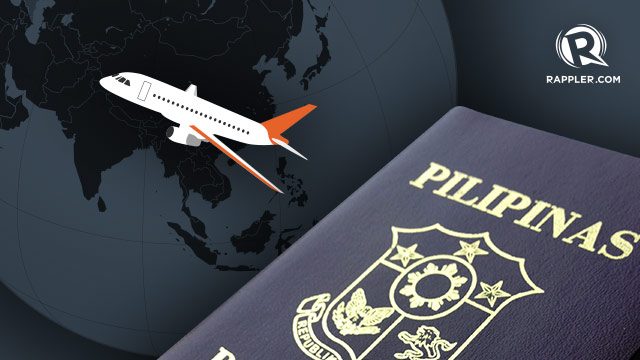SUMMARY
This is AI generated summarization, which may have errors. For context, always refer to the full article.

MANILA, Philippines – The Philippine passport was ranked 76th out of 199 passports, based on Henley & Partners’ latest Visa Restrictions Index for 2015 released on October 26.
This has been the lowest global score garnered by the Philippines in the 10-year analysis of the index. In 2013, the country ranked 69th, while in 2014 it ranked 68th.
Despite this, the country has seen a steady improvment in the number of countries its citizens can enter visa-free, rising from 58 in 2013, to 62 last year.
This is the 8th straight year that the Philippine passport is ranked 5th out of 11 nations in the Southeast Asian region.
In Southeast Asia, Singapore continues to lead the region, ranking 5th globally with visa-free access to 169 countries.
This is followed by Malaysia and Brunei Darussalam with visa-free travel to 163 countries and 150 countries respectively.
Indonesia and Timor-Leste lag behind the Philippines with visa-free access to 55 and 49 countries consecutively.
In 2006 and 2007, Filipinos enjoyed a 4th place ranking amongst its Southeast Asian peers, until it was overtaken by the Thai passport.
At a global ranking of 72nd, citizens of Thailand are able to access 68 countries without the need to secure a visa.
The best and the worst
Globally, Germany and the United Kingdom top the list, with both passports allowing visa-free access to 173 countries out of a possible 218.
Somalia (ranked 107), Iraq (ranked 108) and Afghanistan (ranked 109) are at the bottom of this year’s Index, with visa-free access to only 30, 29 and 25 countries respectively.
The United Arab Emirates (UAE) has seen the biggest improvement this year with an addition of 37 countries and improvement in rank from 55 to 40 with a total of 113 countires that its citizen’s can enter visa free.
The climb can be attributed to a new agreement with the EU for visa-free travel to 36 countries including the 26 Schengen area states, which was made public in May this year, the first Arab country to be granted a European visa waiver.
It is also the biggest climber over the 10 years of the Visa Restrictions Index, and one of only 22 to have moved up in the rankings over the last year.
Sierra Leone, on the other hand, saw the biggest drop, losing 24 places. It was followed by Guinea and Liberia had the next biggest loss of 21 ranks each.
War-torn Syria experienced the third biggest drop this year with a loss of 16 places.
Visa trends of the past decade
The global residence and citizenship planning has been published the annual Visa Restrictions Index for the last decade.
Although the world is becoming ever more globalized, there remains a huge disparity in levels of travel freedom between countries, the latest report said.
Visa requirements define and shape individuals’ ability to travel across borders.
They also reflect strongly on each country’s relationships with others, and will take into account diplomatic relationships between the countries, reciprocal visa arrangements, security risks, and the risks of visa and immigration rules violations.
Looking at movement over the last decade, European countries are notable for their stability over this time – Belgium, France, Italy, Luxembourg, Spain and Sweden all remain in exactly the same position as 10 years before.
The “Top Tens” are almost identical, with 30 countries in 2015, compared to 26 when the initial survey was launched.
While Liechtenstein dropped, the Czech Republic, Finland, Hungary, Malta, Slovakia and South Korea all made it into the top ten.
Taiwan, Albania, UAE, Bosnia and Serbia all moved up more than 20 places in the Index over the last 10 years, while the biggest drops were experienced by Guinea (-35), Liberia (-36), Sierra Leone (-38) and Bolivia (-40).
The growing importance of investment migration can be seen in steady growth of those countries offering residence and citizenship-by-investment.
Countries with these programs continue to perform strongly and all now feature in the top 40 of the Index.
Malta entered the top 10 after launching its Malta Individual Investor Programme, which is ranked as the best citizenship-by-investment program in the world in the Global Residence and Citizenship Programs 2015 report.
Portugal, whose program earned the title as best residence-by-investment program, is in 4th position this year. And the leading Caribbean country, Antigua and Barbuda, moved up again this year.
This decade has also seen the launch of the Investment Migration Council, the worldwide association for investor immigration and citizenship-by-investment, highlighting the increasing understanding and acceptance of this important force in globalization. – Rappler.com
Add a comment
How does this make you feel?
There are no comments yet. Add your comment to start the conversation.